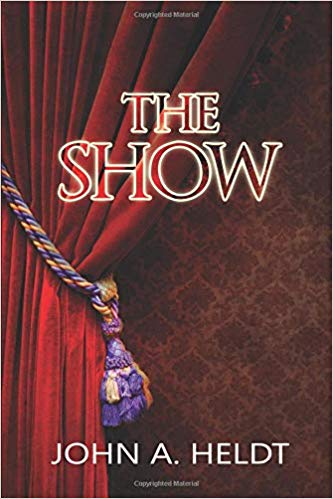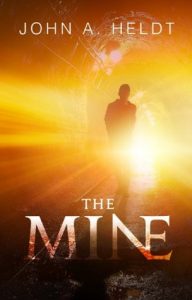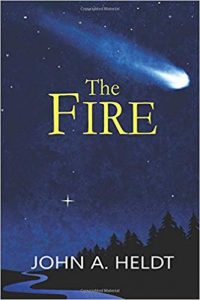 The Show (Northwest Passage #3) by John A. Heldt
The Show (Northwest Passage #3) by John A. Heldt Format: ebook
Source: author
Formats available: paperback, ebook, audiobook
Genres: historical fiction, time travel, time travel romance
Series: Northwest Passage #3
Pages: 293
Published by John A. Heldt on February 16th 2013
Purchasing Info: Author's Website, Amazon
Goodreads
Seattle, 1941. Grace Vandenberg, 21, is having a bad day. Minutes after Pearl Harbor is attacked, she learns that her boyfriend is a time traveler from 2000 who has abandoned her for a future he insists they cannot share. Determined to save their love, she follows him into the new century. But just when happiness is within her grasp, she accidentally enters a second time portal and exits in 1918. Distraught and heartbroken, Grace starts a new life in the age of Woodrow Wilson, silent movies, and the Spanish flu. She meets her parents as young, single adults and befriends a handsome, wounded Army captain just back from the war. In THE SHOW, the sequel to THE MINE, Grace finds love and friendship in the ashes of tragedy as she endures the trial of her life.
My Review:
 While The Show is the third book in the author’s Northwest Passage series, it is much more of a direct sequel to The Mine, the awesome first book in the series, than the second book in the series, the marvelous The Journey, turned out to be.
While The Show is the third book in the author’s Northwest Passage series, it is much more of a direct sequel to The Mine, the awesome first book in the series, than the second book in the series, the marvelous The Journey, turned out to be.
In the Northwest Passage series, at least so far, the protagonists accidentally, or in the case of The Show, accidentally-on-purpose, discover methods of traveling in time. The time travel is complete handwavium – it’s purely a plot device and nothing more. And no more or less believable than the methods used in Outlander.
Not that the time period is the same as Outlander, or even the same from one book in the Northwest Passage series to another. In The Journey, the heroine travels within her own lifetime, and makes changes to her life in the past. Definitely changes for the better from her perspective, but one wonders about the butterfly, its flapping wings, and the effects on the futures of all of the other people who were within her original orbit.
That’s a question that raises its hand and waves vigorously by the end of The Show.
Because both Joel Smith in The Mine and Grace Vandenberg in The Show travel outside of their own lifespans. And then more.
In The Mine, Joel travels from 2000 to the summer of 1941, and leaves on December 8, 1941, the day after Pearl Harbor. He leaves, at least in part, because he knows about WWII and fears that if he finds himself in the Army there is the possibility that he will save someone who should have died, or kill someone who should have lived. He’s worried about that butterfly quite a bit.
But he didn’t worry about it enough not to fall in love back in 1941, and not to leave behind a trail of breadcrumbs that allows someone to follow him to the future. That someone is Grace, the woman he loves and would have married if he had stayed in 1941.
So she comes forward to the future, to him.
It’s all sunshine and roses – not to mention marriage and children, until yet another portal whisks her away from 2002 to 1918. Her journey is just as accidental as Joel’s original trip to the past – but the consequences are even more devastating.
When Joel left 2000 for 1941, he was a young man, fresh out of college, with no dependents and relatively few cares in the world or hostages to fortune. When Grace leaves 2002 for 1918, she’s a wife and mother of two little girls. She leaves everything behind – and can’t figure out how to get back.
Just as Joel did in 1941, Grace manages to make a life back in the past, with relatives that would become hers in the fullness of a time that she has already lived but they haven’t yet experienced.
She has her parents again, this time as contemporaries. She has a front row seat on their courtship. She even manages to fall in love again. It’s not the same, but it’s a life that could be sweet.
And then she discovers that she has one last chance, and it is the last chance, to go back to her real life in 2002 – if she’s willing to leave behind everything she’s found in 1918 to take the chance that this time she can go home.
 Escape Rating B: I enjoyed The Show, but it doesn’t hold up quite as well as my memory of The Mine – which you really need to read before going to The Show. Nor did it grab at my heartstrings in the way that The Journey did.
Escape Rating B: I enjoyed The Show, but it doesn’t hold up quite as well as my memory of The Mine – which you really need to read before going to The Show. Nor did it grab at my heartstrings in the way that The Journey did.
I think that one of the reasons this didn’t grab me quite as hard was that the blurb for the book gives the big plot twist away. We know from the opening pages that Grace is going to travel back in time – and it hangs over the story like the proverbial Sword of Damocles. Grace’s advent into 2000 was way too easy, and I just wanted the story to get to the interesting – and hard – parts.
Grace’s life in the 21st century also raises questions that Joel’s life in 1941 didn’t. How did Grace and Joel even manage to get married in 2000 without Grace having a birth certificate? How did she get a driver’s license – which she definitely did. It’s a detail that niggles at me.
Joel was rightfully worried in 1941 about what would happen if he turned up at an Army recruiter’s office after Pearl Harbor with no birth certificate or ID of any kind. But in the rush to get bodies in uniform he would have had a way easier time than Grace should have had even in the pre-9-11 21st century.
Grace’s story in 1918 was much more tightly focused on Grace, her dilemma and her once and future family than Joel’s was in The Mine. We don’t see nearly as much of the era in which she finds herself as we did with his story. That may also reflect that Grace, as a young woman, would have had fewer opportunities to engage with the wider world in 1918 than Joel did in 1941. Part of the reason that The Journey got to me so much was that I identified with Michelle’s choices very strongly, while Grace’s don’t resonate with me in the same way.
However, one of Grace’s choices that I did empathize with was her eventual decision to move forward in 1918. A choice that some readers seem to have been appalled by. As far as Grace knows, she’s stuck in the past. She doesn’t believe that she has any hope of returning to 2002. She mourns her life there and misses her husband and children desperately, but she came back to the past already pregnant and needs to make some kind of future for herself and her child.
 One final thought about that butterfly flapping its wings. Joel worried about changing the past and thereby changing his future. Grace, on the other hand, when the opportunity arises, rushes to change the past in a way that should prevent the future that gave birth to herself. It’s the ultimate paradox of time travel, and it bothers me that it isn’t addressed in any way.
One final thought about that butterfly flapping its wings. Joel worried about changing the past and thereby changing his future. Grace, on the other hand, when the opportunity arises, rushes to change the past in a way that should prevent the future that gave birth to herself. It’s the ultimate paradox of time travel, and it bothers me that it isn’t addressed in any way.
Then again, this series feels as if its intended as historical fiction mixed with romance and not SF – where the time paradox would get done to death. I’m considering it as much handwavium as the time travel mechanism itself.
And I’ll be back for the next book in the series, The Fire, the next time I need a reading pick-me-up.

 The Journey (Northwest Passage #2) Formats available: paperback, ebook, audiobook
The Journey (Northwest Passage #2) Formats available: paperback, ebook, audiobook